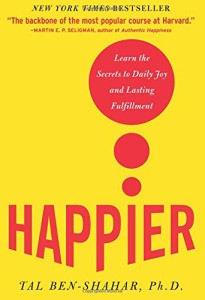By Tal Ben Shahar Ph.D. 2007.
Chapter 8: Happiness in Relationships
Many people believe that the key to a successful relationship is finding the right partner. In fact, however, the most important and challenging component of a happy relationship is not finding the one right person … but rather cultivating the one chosen relationship.
The mistaken notion that finding love guarantees eternal bliss leads partners to neglect the journey—the day-to-day issues, activities, and events that shape the relationship.
We cultivate intimacy by knowing and being known. We can then deepen our intimacy by acting on our knowledge of one another—engaging in activities that are meaningful and pleasurable to ourselves as well as our partner. Over time, as we get to know one another and spend time together engaged in activities that we care about most, we build a foundation that can weather inevitable storms as well as provide fertile ground for love, and happiness, to blossom.
Chapter 9: First Meditation: Self-Interest and Benevolence
Contributing to other people’s happiness provides us with meaning and pleasure, which is why helping others is one of the essential components of a happy life.
Research by Barbara Frederickson suggests that positive emotions broaden the scope of our attention. When we’re happy, then, we are more likely to see beyond our narrow, inward-looking, and self-centered perspective and focus on others’ needs and wants. Research by Alice Isen and Jennifer George illustrates that we are more likely to help others when we feel good.
We often enhance our happiness to the greatest extent when we pursue activities that provide us with meaning and pleasure and that help others. When making choices, we first need to ask ourselves what would make us happy independent of how much it might contribute to the happiness of others.
Chapter 10: Second Meditation: Happiness Boosters
Seventeenth-century British poet John Dryden said that “we first make our habits and then our habits make us.” And if we are in the habit of living as rat-racers—having been conditioned to do so from an early age—it is extremely difficult to disembark from the treadmill.
Chapter 11: Third Meditation: Beyond the Temporary High
Happiness depends upon ourselves. – Aristotle
The average is indicative of a trend, not of a necessity or of a universal truth. Often, it is those outside the norm, the exceptional ones, who point to the truth of what is possible. That some people, throughout their lives, enjoy progressively higher levels of happiness indicates that it is possible to reset the thermostat.
Conclusion
Be the change you wish to see in the world. – Gandhi
I am optimistic about the possibility of change toward a more emotionally prosperous society. I believe that people can find work that will provide them with present and future benefit, that people can find education a rich source of the ultimate currency, that people can find meaningful and pleasurable relationships. I believe that the happiness revolution will come about. I do not, however, believe that these changes will happen overnight.
To realize, to make real, life’s potential for the ultimate currency, we must first accept that “this is it”—that all there is to life is the day-to-day, the ordinary, the details of the mosaic. We are living a happy life when we derive pleasure and meaning while spending time with our loved ones, or learning something new, or engaging in a project at work. The more our days are filled with these experiences, the happier we become. This is all there is to it.

